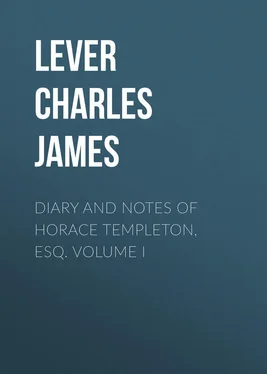Charles Lever - Diary And Notes Of Horace Templeton, Esq. Volume I
Здесь есть возможность читать онлайн «Charles Lever - Diary And Notes Of Horace Templeton, Esq. Volume I» — ознакомительный отрывок электронной книги совершенно бесплатно, а после прочтения отрывка купить полную версию. В некоторых случаях можно слушать аудио, скачать через торрент в формате fb2 и присутствует краткое содержание. Жанр: literature_19, foreign_antique, foreign_prose, на английском языке. Описание произведения, (предисловие) а так же отзывы посетителей доступны на портале библиотеки ЛибКат.
- Название:Diary And Notes Of Horace Templeton, Esq. Volume I
- Автор:
- Жанр:
- Год:неизвестен
- ISBN:нет данных
- Рейтинг книги:4 / 5. Голосов: 1
-
Избранное:Добавить в избранное
- Отзывы:
-
Ваша оценка:
- 80
- 1
- 2
- 3
- 4
- 5
Diary And Notes Of Horace Templeton, Esq. Volume I: краткое содержание, описание и аннотация
Предлагаем к чтению аннотацию, описание, краткое содержание или предисловие (зависит от того, что написал сам автор книги «Diary And Notes Of Horace Templeton, Esq. Volume I»). Если вы не нашли необходимую информацию о книге — напишите в комментариях, мы постараемся отыскать её.
Diary And Notes Of Horace Templeton, Esq. Volume I — читать онлайн ознакомительный отрывок
Ниже представлен текст книги, разбитый по страницам. Система сохранения места последней прочитанной страницы, позволяет с удобством читать онлайн бесплатно книгу «Diary And Notes Of Horace Templeton, Esq. Volume I», без необходимости каждый раз заново искать на чём Вы остановились. Поставьте закладку, и сможете в любой момент перейти на страницу, на которой закончили чтение.
Интервал:
Закладка:
“Admirably spoken, Marquis!” said the King; “the sentiment is quite worthy of one who has the best blood of Sicily in his veins. But remember what an artificial state of society we live in; think of our conventional usages, and what a shock it gives to public opinion when one, placed in so exalted a position as you are, so palpably affronts universal and admitted custom; recollect that your reserve involves a censure on others, less suspicious, and, we would hope, not less rigidly honourable men, than yourself.”
“But what would your Majesty counsel?”
“Select a cavalière yourself, as little likely to excite your jealousy as you please; as little agreeable as possible, if you prefer it: but, comply at least so far with the world’s prescription, and do not shock our worthy Neapolitans by appearing to reflect upon them. There, what say you to that boy yonder? he is only a boy – he has just joined the English mission here. I’m sure he has formed no tender engagements to prevent you adopting him, and you will at least seem to conform with the usages of your neighbours.”
“If your Majesty commands – ”
“Nay, Marquis, I but advise.”
“Your Majesty’s wish is always a command. I feel proud to obey.”
“Then, I am very happy to say I wish it,” said the King, who turned away, dying to tell the court-party how miserable he had made the old Marquis.
Such are débauché Kings; the glorious prerogative of power becomes the mere agent of perverted ingenuity to work mischief and do wrong!
The poor Marquis lost no time to follow out the royal commands, and at once made acquaintance with Beauclerc – only too happy to be noticed in such a quarter. I know not whether the lady was much gratified by the result of this kingly interposition in her favour: some said, Yes, and that the youth was really gifted and spirituel , with a vein of quiet, caustic humour, most amusing; others – and I half incline to this notion – pronounced him dull and uninteresting. At all events, the Marquesa enjoyed the liberty of appearing often in public, and seeing more of the world than heretofore. She usually visited the San Carlos, too, twice a week; a great improvement in her daily life, as previously the Opera was denied her.
Immediately over the Marquesa’s box was the large box, or rather salon , belonging to the club of the Italian nobili , who frequented the theatre far less for the pleasures of the opera and the ballet than for the more exciting delights of faro and écarté ; and here, nightly, were assembled all the most dissipated and spendthrift youth of a capital, whose very gravest and most exemplary citizens would be reckoned “light company” any where else.
High play, with all its consequences of passionate outbreaks, ruin, and duelling, were the pastimes of this ill-fated loge ; and, notwithstanding the attractions the box underneath contained, Jack Beauclerc was far oftener in the second tier than the first. He was, indeed, a most inveterate gambler; and the few moments which he devoted to attending the Marquesa to her box, or her carriage, were so many instants of pregnant impatience till he was back at the play-table.
It was on one evening, when, having lost a very heavy sum, that his turn came to deal; and, with the superstitious feeling that only a play-man can understand, he resolved to stake a very large amount upon the game. The attention of the bystanders – never very deeply engaged by the scène – was now entirely engrossed by the play-table, where Beauclerc and his adversary were seated at écarté . It was that critical moment when the cards were dealt, but the trump not yet turned, and Beauclerc sat enjoying, with a gambler’s “malign” delight, the eager anxiety in the other player’s countenance, when suddenly a voice said, —
“Ha, Beauclerc! the Marquesa is rising – she is about to leave the theatre.”
“Impossible!” said he; “it is only the second act.”
“It is quite true, though,” rejoined another; “she is putting on her mantle.”
“Never mind our party, then,” cried Beauclerc’s antagonist; “I will hold myself ready to play the match out whenever you please.”
“I please it now, then!” said he, with a degree of energy that heavy losses had, in spite of him, rendered uncontrollable.
“Il Signor Beauclerc!” said a servant, approaching, “the Marquis d’Espagna desires to see you.”
“Tell him I am engaged – I can’t come,” said Beauclerc, turning up the trump-card, which he held out triumphantly before his adversary, saying, “The king!”
At the same instant the old Marquis entered, and, approaching the table, whispered a few words in his ear. If an adder had pierced him with its sting, Beauclerc could not have started with a more agonised expression; and he sprang from the chair and rushed out of the theatre, not by the door, however, where the Marquesa’s carriage was yet standing, but by a private passage, which led more easily towards his lodgings.
“What is this piece of news, that all are so amused by?” said the King, the next morning, as he was rising.
“Your majesty alludes to the Marquis d’Es-pagna, no doubt,” said Count Villafranca. “He challenged the young English attaché last night, at the theatre, and they have been out this morning; and, strange to say, that the Marquis, the very best swordsman we have ever had here, was disarmed and run through the side by his antagonist.”
“Is the wound dangerous?” said the King, coolly.
“I believe not, your Majesty. Beauclerc has behaved very well since it happened; he has not left the Marquis for a moment, and has, they say, asked pardon most humbly for his offence, which was, indeed, a very gross neglect of the Marchesa no husband could pardon.”
“So I heard,” said the King, yawning. “The Marquis is very tiresome, and a great bore: but, for all that, he is a man of spirit; and I am glad he has shewn this young foreigner that Italian honour cannot be outraged with impunity!”
Such is the true version; and, let people smile as they like at the theory, I can assure them it is no laughing matter. It is, doubtless, somewhat strange to our northern ideas of domestic happiness that a husband should feel called on to punish a want of sufficient attention to his wife, from the man whom the world regards as her lover. We have our own ideas on the subject; and, however sensitive we may feel on this subject, I sincerely hope we shall never push punctilio so far as the Neapolitans.
Such, without the slightest exaggeration, are the pictures Italy presents, for more impressive on the minds of our travelling youth than all that Correggio has touched or Raphael rendered immortal. Will their contemplation injure us? Shall we become by habit more lenient to vice, and less averse to its shame? or shall we, as some say, be only more charitable to others, and less hypocritical ourselves? I sadly fear that, in losing what many call “our affected prudery,” we lose the best safeguard of virtue. It was, at the least, the “livery of honour,” and we shewed ourselves not ashamed to wear it. And yet there are those who will talk to you – ay, and talk courageously – of the domestic LIFE OP ITALY!
The remark has been so often made, that by the mere force of repetition it has become like an acknowledged truth, that, although strangers are rarely admitted within its precincts, there exists in Italy and in Italian cities a state of domestic enjoyment to which our boasted home-life in England must yield the palm. Never was there any more absurd assertion less propped by fact – never was the “ ignotum ” so easily taken “ pro beatifico .”
Читать дальшеИнтервал:
Закладка:
Похожие книги на «Diary And Notes Of Horace Templeton, Esq. Volume I»
Представляем Вашему вниманию похожие книги на «Diary And Notes Of Horace Templeton, Esq. Volume I» списком для выбора. Мы отобрали схожую по названию и смыслу литературу в надежде предоставить читателям больше вариантов отыскать новые, интересные, ещё непрочитанные произведения.
Обсуждение, отзывы о книге «Diary And Notes Of Horace Templeton, Esq. Volume I» и просто собственные мнения читателей. Оставьте ваши комментарии, напишите, что Вы думаете о произведении, его смысле или главных героях. Укажите что конкретно понравилось, а что нет, и почему Вы так считаете.












